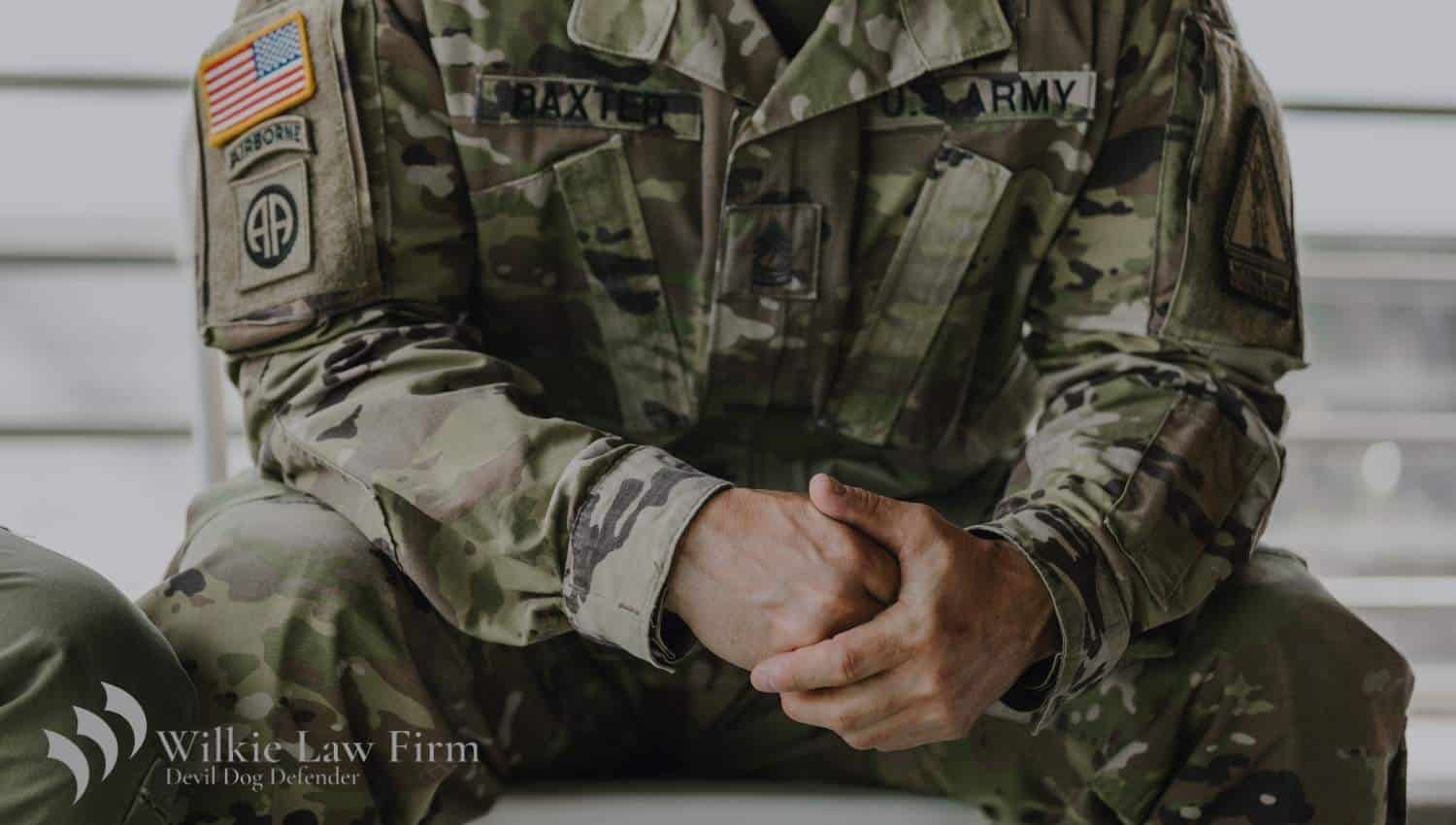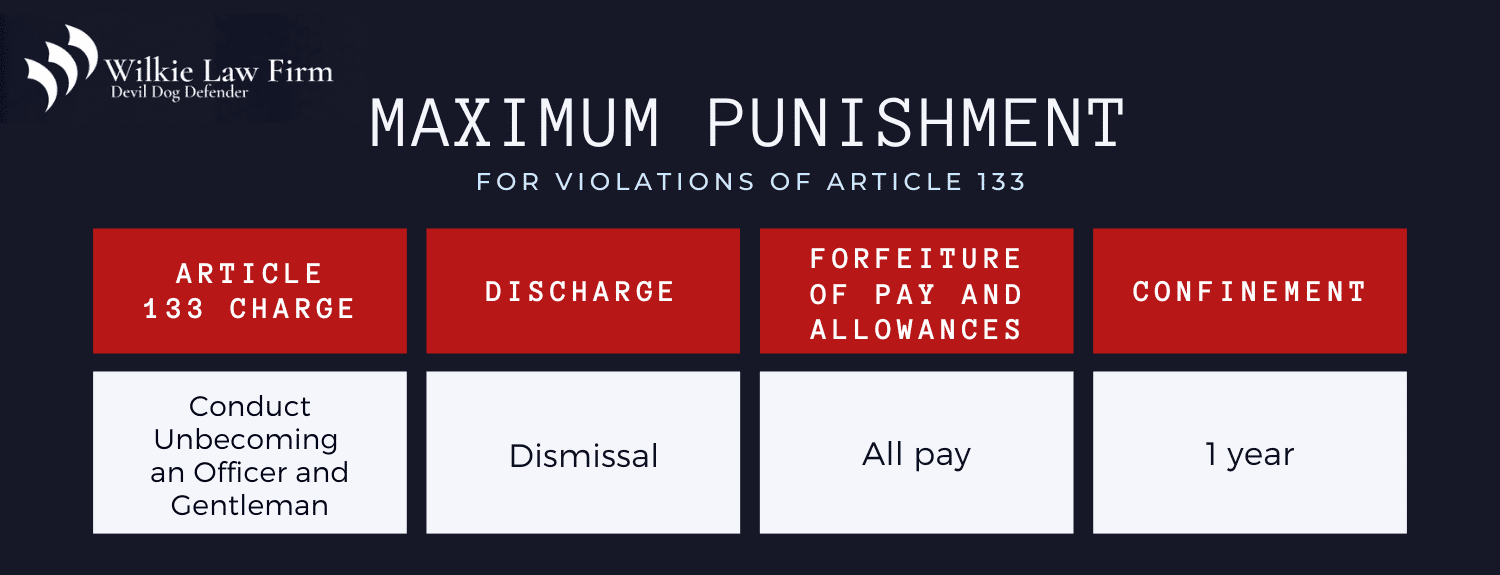UCMJ Art. 133
Military Defense Attorney for Article 133 Violations
Home » Article 133
Military Counsel
UCMJ Articles
UCMJ Article 133 – Conduct Unbecoming an Officer
Table of Contents
Members of the armed forces are subject to a completely different set of laws than civilian society. These laws are found in what is called the Uniform Code of Military Justice, or the UCMJ Articles. There are hundreds of articles within the UCMJ, each covering a different violation of military law.
There are two general categories of offenses listed in the punitive articles section of the UCMJ: offenses that have a civilian counterpart – such as murder (Article 118) or rape (Article 120) – and the category known as “military specific,” or offenses unique to the military. These military-centric offenses may criminalize both conduct that does occur in the civilian world but is not illegal, such as adultery, as well as offenses that there is no analog for in the civilian world.
Here, our experienced North Carolina military defense lawyer at the The Wilkie Law Group will go over the specifics of UCMJ Article 133, which covers Conduct Unbecoming an Officer and a Gentleman.
What is Article 133 of the UCMJ?
Article 133, conduct unbecoming an officer and a gentleman (regardless of gender), is an example of a purely military offense. This article states there is a military necessity to prevent compromising the person’s standing as an officer. Therefore, the article attempts to set limits of tolerance for falling below certain moral attributes common to the ideal officer and the perfect gentleman. In addition, this article includes acts made punishable by any other article and is often added to a specific offense (such as larceny, for example).

10 U.S.C. § 933 – Art. 133
The exact text of UCMJ Article 133 can be found in 10 U.S.C. § 933 – Art. 133, which states: Any commissioned officer, cadet, or midshipman who is convicted of conduct unbecoming an officer shall be punished as a court-martial may direct. The code also clarifies the following in regards to Article 133:
- Officers are held to a higher standard of behavior than their subordinates;
- Not everyone is or can be expected to meet unrealistically high moral standards, but there is a limit of tolerance based on customs of the service and military necessity below which the personal standards of an officer cannot fall without seriously compromising the person’s standing as an officer or the person’s character as a gentleman;
- This heightened standard for officers commands respect and obedience and preserves their ability to lead and command their subordinates.
- An officer’s conduct need not violate other provisions of the UCMJ or even be otherwise criminal to violate Article 133 UCMJ.
Elements of a UCMJ Article 133 Violation
The elements required to violate this order are listed below.
- That the accused did or omitted to do certain acts; and,
- Under the circumstances, the acts or omitted acts constituted conduct unbecoming an officer and gentleman.
According to the Article, the essence of an Art. 133 violation is that the officer’s conduct “disgraces him personally or brings dishonor to the military profession such as to affect his fitness to command the obedience of his subordinates so as to successfully complete the military mission.” Due process for conduct unbecoming of commissioned officers requires fair notice by custom, regulation or other, that the conduct is forbidden and subject to criminal sanction. Violation of this article focuses on the conduct of the service member and how the conduct compromises the ability to command. As stated by William Winthrop in Military Law and Precedents 711-12 (2d ed. 1920), for the conduct in question to be “unbecoming” it must be conduct that “must offend so seriously against law, justice, morality or decorum as to expose to disgrace, socially or as a man, the offender, and at the same time must be of such a nature or committed under such circumstances as to bring dishonor or disrepute upon the military profession which the officer represents.”
What is “Conduct Unbecoming”?
The military courts have defined “unbecoming conduct” as that conduct which is “morally unfitting and unworthy, rather than merely inappropriate or unsuitable. It is misbehavior that is more than merely a lack of good taste or propriety. United States v. Rogers, 45 M.J. 244, 255-256 (C.A.A.F. 2000). More specifically, conduct unbecoming describes a lack of certain moral attributes, including acts demonstrated by:
- Dishonesty
- Unfair dealing
- Indecency
- Indecorum
- Lawlessness
- Injustice
- Cruelty
Furthermore, the courts have said that private conduct in some circumstances may constitute an offense under this article. In addition, it is not “double dipping” to have a situation where an officer can be charged with an underlying offense (e.g., viewing child pornography) and also be charged with an Article 133 violation for the exact same officer misconduct as a lesser included offense. The courts have also made clear the reference of men in the language of the statute applies equally to women or female commissioned officers. Unites States v. Moore, 38 M.J. 490 (C.M.A. 1994); United States v. Norvell, 26 M.J. 477 (C.M.A. 1988).
What are the Penalties for an Article 133 UCMJ Violation?
If you are facing a court martial and potential military punishment due to an Article 133 violation, do not take it lightly. If you receive the maximum punishment, your entire military career is at stake. You’re looking at a year behind bars as well as the risk of losing benefits, status, all pay and allowances, and so much more. Military prosecutors tend to look at these offenses as an easy conviction, so it’s extremely important that you consult with a qualified military defense attorney as soon as possible to ensure your charges are fought aggressively from the very beginning. In order to prove beyond a reasonable doubt that the accused’s conduct was in violation of Article 133 of the UCMJ, the prosecution’s case must provide competent evidence that the servicemember’s actions or omissions constituted conduct unbecoming of a military officer and a gentleman. A conviction also requires fair or proper notice that the conduct is considered unbecoming and is therefore a violation of Article 133. A good military defense attorney with an extensive set of skills, knowledge, and experience defending service members in these types of cases offers your best chance at fighting the allegations against you and achieving the best possible outcome on your behalf.
Breakdown of UCMJ Article 133
Below, we’ll include a brief overview of all the elements required to constitute an Article 133 UCMJ violation, as well as a more specific explanation of the offenses.
Article 133 Elements
- That the accused did or omitted to do certain acts; and,
- That, under the circumstances, the acts or omitted acts constituted conduct unbecoming an officer and a gentleman.
Explanation
Gentleman. As used in this article, gentlemen includes both male and female commission officers, cadets, and midshipmen. The term “gentleman” connotes failings in an officer’s personal character, regardless of gender.
Nature of offense. An officer’s conduct violative of this article is action or behavior in an official capacity which, in dishonoring or disgracing the person as an officer, seriously compromises the officer’s character as a gentleman, or action or behavior in an unofficial or private capacity which, in dishonoring or disgracing the officer personally, seriously compromises the person’s standing as an officer.
Examples of offenses. (Partial list) Knowingly making false official statements; dishonorable failure to pay a debt; using insulting or defamatory language to another officer in that officer’s presence or about that officer to other military persons; being drunk or disorderly in a public place; public association with known prostitutes; committing or attempting to commit a crime involving moral turpitude.
Military Criminal Defense Attorney for Article 133 Violation
Military officers are held to higher standards than the enlisted personnel they lead, and they stand to lose a lot when they face a conviction for violation of Article 133 UCMJ. That’s why they need someone in their corner who knows the military legal code through and through and whose only concern is fighting as hard as possible for their rights, freedom, and future. While free, a military-appointed JAG criminal defense attorney often faces undue influence from a superior military chain of command. This means they tend to consider their own concerns and interests before their client’s. Civilian criminal defense lawyers like those at The Wilkie Law Group are able to work with the freedom of legal maneuver, with no threat to their own rank or position, and with only their client’s best interest at heart.
Whether you’re under investigation or pending courts-martial for military criminal conduct, you need the power of a qualified civilian criminal defense attorney like the Devil Dog Defender, Aden Wilkie. In addition to creating a strong legal defense and handling all court martial and military criminal justice matters, Aden can also provide superior military discharge upgrade counsel and record correction, as well. Located in Jacksonville, NC, Aden Wilkie services armed forces at Camp Lejeune and Fort Bragg as well as other bases, camps, stations, and posts across the nation.
Please keep in mind that this article is for general information purposes. Once an attorney-client relationship with Aden Wilkie is established, you will be able to learn more about your legal options regarding your unique case. Call 910-333-9626 today for a consultation or complete our online intake form to learn more.
Contact an Article 133 Counseling Attorney
It is vital to use the knowledge of a seasoned attorney to organize and prioritize the material to present to the command. Call The Wilkie Law Group at 910-333-9626 to arrange your consultation.






